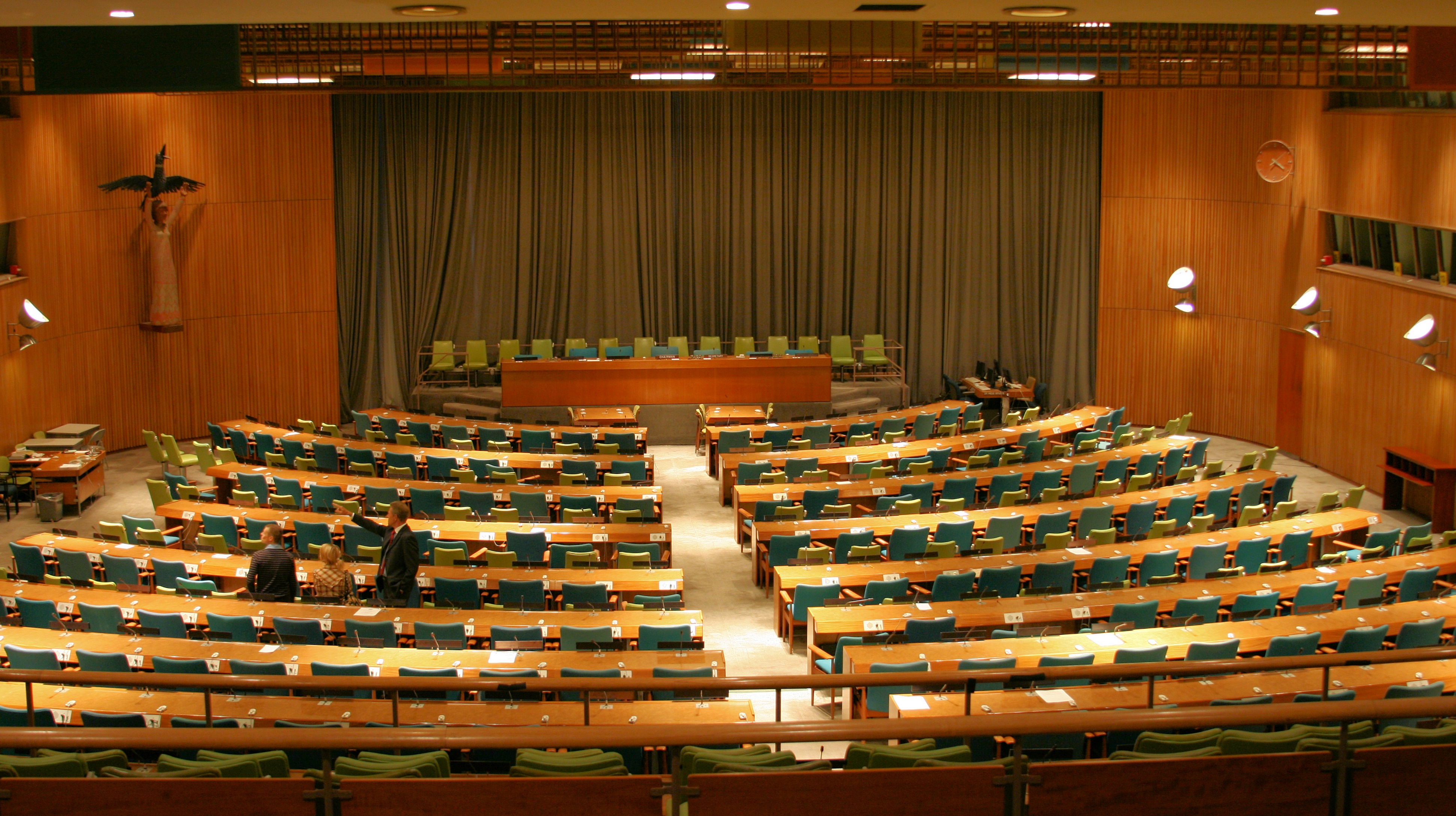- United Nations Trusteeship Council
Infobox UN
name = United Nations Trusteeship Council

caption = The chamber of the UN Trusteeship Council, UN headquarters, New York
type = Principal Organ
acronyms =
head = "President"
:Michel Duclos :FRA"Vice-President"
:Adam Thomson:UK
status = Inactive (as of 1994)
established = 1945
website = [http://www.un.org/documents/tc.htm www.un.org/documents/tc.htm]
parent =
subsidiaries =
commons =
footnotes =The United Nations Trusteeship Council, one of the principal organs of the
United Nations , was established to help ensure that non-self-governing territories were administered in the best interests of the inhabitants and of international peace and security. The trust territories – most of them former mandates of theLeague of Nations or territories taken from nations defeated at the end ofWorld War II – have all now attained self-government orindependence , either as separate nations or by joining neighbouring independent countries. The last wasPalau , which became a member state of the United Nations in December 1994.History
The Trusteeship Council was formed in 1945 to oversee the
decolonization of those dependent territories that were to be placed under the international trusteeship system created by theUnited Nations Charter as a successor to theLeague of Nations mandate system. Ultimately, eleven territories were placed under trusteeship: seven in Africa and four inOceania . Ten of the trust territories had previously been League of Nations mandates; the eleventh wasItalian Somaliland .Under the Charter, the Trusteeship Council was to consist of an equal number of United Nations Member States administering trust territories and non-administering states. Thus, the Council was to consist of (1) all U.N. members administering trust territories, (2) the five permanent members of the
Security Council , and (3) as many other non-administering members as needed to equalize the number of administering and non-administering members, elected by theUnited Nations General Assembly for renewable three-year terms. Over time, as trust territories attained independence, the size and workload of the Trusteeship Council was reduced and ultimately came to include only the five permanent Security Council members (China, France, the Soviet Union/Russian Federation, the United Kingdom, and the United States).With the independence of
Palau , formerly part of theTrust Territory of the Pacific Islands , in 1994, there presently are no trust territories, leaving the Trusteeship Council without responsibilities. (Since theNorthern Mariana Islands was a part of theTrust Territory of the Pacific Islands and became a commonwealth of the USA in 1986, it is technically the only area to have not joined as a part of another state or gained full independence as a sovereign nation.)The Trusteeship Council was not assigned responsibility for colonial territories outside the trusteeship system, although the Charter did establish the principle that member states were to administer such territories in conformity with the best interests of their inhabitants.
Present status
Its mission fulfilled, the Trusteeship Council suspended its operation on
1 November 1994 , and although under theUnited Nations Charter it continues to exist on paper, its future role and even existence remains uncertain. The Trusteeship Council is currently (as of 2005 ) headed byMichel Duclos , with Adam Thomson as vice-president [ [http://www.un.org/News/Press/docs/2004/tr2426.doc.htm Trusteeship Council elects President, Vice-President; Adopts agenda for 64th session] , United Nations Press Release TR/2426,20 October 2004 ] , although the sole current duty of these officers is to meet with the heads of other UN agencies on occasion. Initially they met annually, but according to a UN press release from their session in 2004:The Council amended its rules of procedure to drop the obligation to meet annually and agreed to meet as the occasion required. It now meets by its own decision, the decision of its President, at a request from a majority of its members, or at a request from the General Assembly or Security Council.
Future prospects
The formal elimination of the Trusteeship Council would require the revision of the UN Charter, which is why it hasn't been pursued. Other functions have been thought of.
The Commission on Global Governance's
1994 report recommends an expansion of the trusteeship councilFact|date=September 2008. Their theory is that an international regulatory body is needed to protect environmental integrity on the two-thirds of the world’s surface that is outside national jurisdictions [Shaw, John: [http://www.washdiplomat.com/01-11/a1_11_01.html UN Adviser Says World Must Focus On Sustainable Development] , The Washington Diplomat] .In
March 2005 , however, UN Secretary-GeneralKofi Annan proposed a sweeping reform of the United Nations, including an expansion of theSecurity Council . As this restructuring would involve significant changes to the UN charter, Annan proposed the complete elimination of the Trusteeship Council as part of these reforms [ [http://www.reuters.com/financeNewsArticle.jhtml?type=bondsNews&storyID=7953954 Main points of Annan's new UN reform plans] , Reuters,20 March 2005 ] .See also
*
United Nations Trust Territories
*United Nations Charter
*United Nations System
*UN General Assembly
*UN Security Council
*UN Secretariat
*International Court of Justice
*United Nations Interpretation Service References
External links
* [http://www.un.org/documents/tc.htm Trusteeship Council UN web site]
Wikimedia Foundation. 2010.
